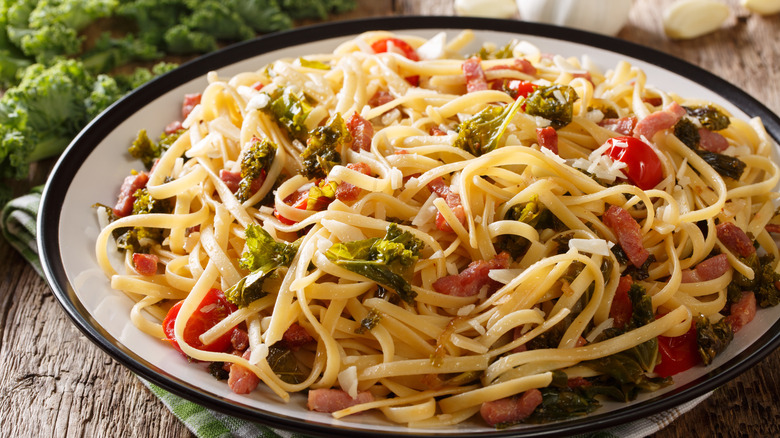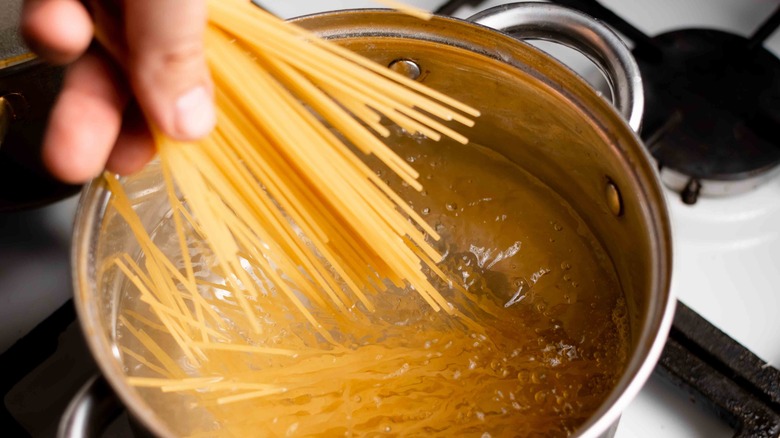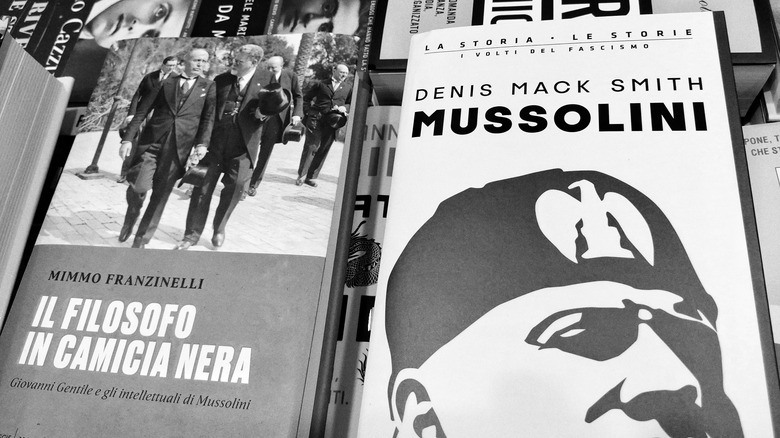Italy's Marinetti Pasta Has A Controversial History
Marinetti pasta sauce is a tomato-based sauce filled with salty capers, artichokes sauteed in butter, anchovies, diced ham, and finely chopped pistachios. It's texturally diverse, packed with unexpected flavors, and served over a long, thin pasta like spaghetti or linguine. Sounds delicious? Italian foodies seemed to think so. Marinetti sauce won "La Cucina Italiana" culinary magazine's Best Pasta Sauce award in 1932. But, its flavor wasn't the only (or even the primary) reason why Marinetti pasta gained public notoriety.
The dish takes its name from Filippo Tommaso Marinetti, the Italian writer historically credited with founding the Futurist movement. He started the movement in 1909 when his "Founding and Manifesto of Futurism" was published in the French newspaper "Le Figaro." Marinetti pasta might seem like an homage, but the title is pretty tongue-in-cheek: Marinetti was vocally disavowing the prominence of pasta in Italy during the '30s.
In 1930, Marinetti himself had a piece published in "La Cucina Italiana." Titled "Manifesto of Futurist Cooking," it criticized what Marinetti saw as Italy's near-religious piety for pasta and prescribed that the country ban the dish altogether. (Marinetti would go on to expand this idea into an entire collection aptly called "The Futurist Cookbook," published in 1932 — the same year Marinetti Pasta won Best Pasta Sauce.) The prescription started a dialogue that bubbled over into a nationwide controversy.
Forget antipasto – Futurists were anti-pasta
Italian Futurism was an intellectual and artistic movement characterized by restlessness and the pursuit of innovation, a generational propelling forward. Futurists were intentionally controversial pot-stirrers. (Food pun noted.) The point was to shake people up. Marinetti didn't literally want to outlaw pasta; he wanted consumers to question their piety to the past and its institutions and question whether those institutions were serving them or keeping them static. The sarcastic aggressivity of Futuristic writing was meant to convey urgency and intolerance for moderation.
No longer would cultural identity be found in the past, said Futurists. Marinetti thought that attachment to tradition was the great hamartia of large-scale cultural growth — and in Italy, few things say "tradition" like pasta. He wrote that pasta causes "laziness, pessimism, nostalgic inactivity, and neutralism." (Admittedly, as anyone who's ever been swept away by a post-pasta carb nap can attest to, he might've been on to something there.)
So, what did the ideal "Futurist mealtime" look like? Intentionally absurd. Hypotheses included getting rid of eating utensils altogether (bye-bye, spoon) and unappetizing, ridiculous food pairings like herring and strawberry gelatin or veal and absinthe. But, as far-out as these ideas might seem (as was the writers' intention), not every reader interpreted these concepts as conceptual. To some, these suggestions were very literal.
Futurism might have created the experimental food scene
As the Futurist scene was unfolding during the early 1930s, fascist dictator Benito Mussolini happened to be rising to power in Italy. He wanted to isolate the country from foreign wheat exports (i.e. pasta) and was trying to convince Italians to start eating rice (which was easier to produce domestically). Since rice was a new idea for Italian foodies, Marinetti hopped on board, and Mussolini was all too happy to support Marinetti's symbiotic anti-pasta campaign. Predictably, social havoc ensued. Diehard pasta fans wrote pamphlets and established community organizations in defense of the dish. Futurists doubled down on their intellectual crusade against the comfort food. But, the battle was cut short by an actual battle when Italy entered WWII in 1940. Both Marinetti and Mussolini died in the 1940s.
Admittedly, Futurism had some glaring ideological inconsistencies (like being inherently anti-feminist despite supposedly renouncing past cultural paradigms). But, Cubism, free-verse poetry, and abstract theater all emerged from the movement. Perhaps most notably, Italian Futurism was one of the first schools to recognize food as art and to challenge what "food" could mean or be. In its radical advocacy for the contemporary, Futurists effectively championed the sort of imaginative, avant-garde creations Michelin-starred restaurants are charging the big bucks for today. Next time you're watching a cooking show and one of the contestants makes a "deconstructed" PB&J, you can thank Marinetti (and his controversial pasta dish) for bringing the idea to the table.


